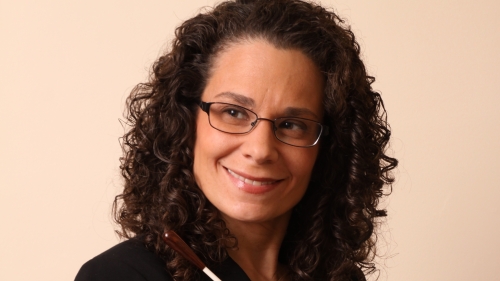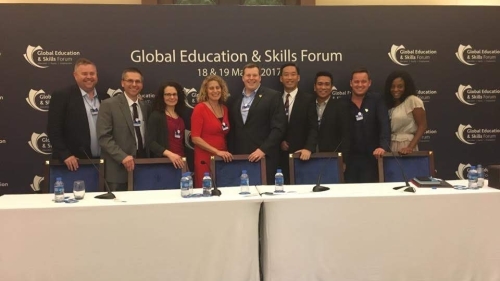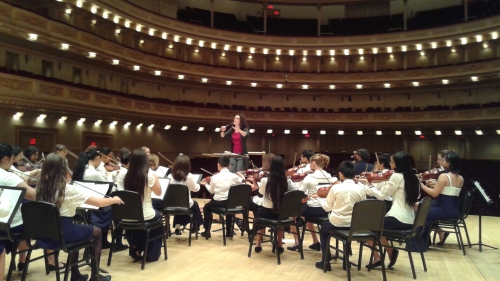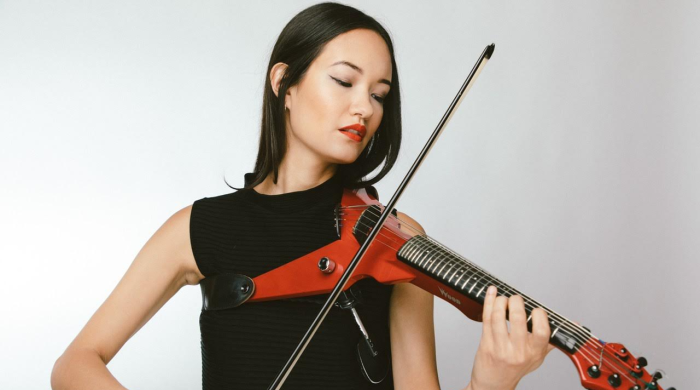Melissa Morris (MA '00) is a music education alumna who serves as co-director for the Salute to Music Orchestra program in Staten Island and director of Guitar and the Global Classroom at James Madison High School in Brooklyn. She is a co-founder of the Music Teachers for Global Peace Foundation.
Melissa was a top 50 finalist for the $1 million dollar Global Teacher Prize in 2015 and a quarter finalist for the Grammy Music Educator Award. She has also been awarded the Bertelsmann Corporation’s Teacher Award for Excellence in Creativity and Inspiration and the Distinguished Educator Award from Wagner College. Her teaching methods have also been recognized by the Grammy Foundation and the Recording Academy, a connection that resulted in her students recording (and releasing) an EP in 2014. Most recently, Melissa received the $10,000 Sanford Teaching Award for the State of New York. She is the proud mother of her young son, Charles.
We asked her about her career in music education.

How did you become interested in music education?
It wasn’t until my sophomore year at The Hartt School (The University of Hartford) that I ever considered music education. At that time, I was a classical guitar performance major. My roommate was a horn player and a music ed major. She would come back to our apartment with all the “cool homework.” She was learning to play a different instrument every few weeks, playing musical games and using me as her practice “student” at home. She was always so light hearted, and me, well, I was always so focused and serious, trying to stay at the top of my performing abilities. “I want to take those classes!” I would say to her. She would say with a chuckle, “Change your major!” And so I did… Confession: It wasn’t because I suddenly could see myself as a teacher; it was so that I too could have an opportunity to learn ALL the other instruments.
I'm exactly where I believe I was meant to be -- in my classroom, building communities, and helping young people find and follow their dreams."
Melissa Morris on stage.
The weekend before my graduation, I was in an accident that left my right side of my upper body badly injured. The pain that I would experience in the right side of my neck and upper body made practicing my guitar extremely challenging. This accident rendered my performance career on hold; perhaps permanently. It was a struggle to make it through a performance I had booked well before the accident. I played (injured and in pain) to a packed house. Standing room only! That would be my debut and retirement performance all in one shot. A bittersweet ending to a career that never had a chance to flourish, but I suppose the universe works in mysterious ways! Could it have foreseen my future for me and prepared me for what would be on my horizon? Perhaps!
I don’t look back on what I could have had in my guitar performance career. I do look back and thank the universe for paving the way to complete and utter musical, and spiritual fulfillment. I'm exactly where I believe I was meant to be -- in my classroom, building communities, and helping young people find and follow their dreams.

Melissa Morris (third from left) presented, “Cultivating Creativity and Curiosity: A Briefing on Arts Education," in Dubai.
Why is music education important?
Like so many musicians, I believe that music has the power to create a more harmonious world. Like so many other educators, I believe we can empower our children to be the great change agents the world needs. Though music we naturally, and without question, learn to appreciate diversity. We seek out diverse ensembles to fill out the sound that our ear craves. We seek out music that helps us celebrate cultures, feel rhythms, hear melodies and tonalities both familiar and unfamiliar to our ear. Musicians are most content when that exploration brings them to music of different cultures, genres, time periods. As a teacher, I feel it's my responsibility to take my students on a journey through music of all cultures and to make an emotional connection to sounds they have never heard before. I am an advocate for music education and the arts because the study of music enriches a person's life in ways no other content area can. The arts pave the way for students to become more appreciative of cultural differences, but perhaps more importantly it illuminates the similarities we share with people across the globe. This appreciation is fundamental to our growth of global citizens.
Though music we naturally, and without question, learn to appreciate diversity. We seek out diverse ensembles to fill out the sound that our ear craves. We seek out music that helps us celebrate cultures, feel rhythms, hear melodies and tonalities both familiar and unfamiliar to our ear."

Melissa Morris (in red) rehearsing at Carnegie Hall's Stern Auditorium with her Salute to Music Orchestra Students.
How are you teaching during the pandemic?
As a school, as a department, we didn’t know what to make of the whole remote thing initially, so we assembled a planning committee and went to work finding resources, hashing out potential issues, and attempting to solve problems before they arose. You know when you attempt to solve problems before you have any clue what those problems could be, you often get it wrong. We got it wrong so many times! Luckily I can improvise as needed. There was a lot of that in the beginning. In fact, musicians are really good at solving problems on the fly. We (musicians) thrive on improvisation actually!
We found that while we have an awareness of inequities both locally and globally, we had no true understanding of the deep inequalities that exist within our school community. We knew most of the students did not have instruments at home. We knew that live instruction wouldn’t be widely attended due to the fact that many of our students were not in possession of computers at home, and if they did have a computer, it was likely one computer for the entire family. When we began planning as a department for this crisis we didn’t talk much about kids who lived in shelters or kids who did not have wifi of any kind. We planned low-tech options and high-tech options. We planned choice boards for kids and we found online resources to help us create “meaningful music instruction.” After all of the creative problem solving and the improvisational learning, we were forced to adapt to the unknown each and every day.
In the end, I believe my classes ended up with something much more important than I had originally planned. They ended up with a smarter teacher who was learning to adjust to the inequities of our school community, who was more knowledgeable about them as individuals, and could empathize better now knowing the bigger picture. They ended up with a teacher who made phone calls, who provided snapchat videos with crazy filters to make them chuckle each day. They ended up with a teacher who found performing artists who helped us get through the crisis one social media concert at a time. They ended up with a teacher who placed the experience of working together in higher regard over content knowledge. They ended up with a teacher who was willing to meet them where they were, as opposed to asking them to meet her where she wanted them to be musically and academically. This crisis highlighted the true role of a teacher. We elevate and empower our students by meeting them where they are and understanding what they need.
Related Articles
From Music Business to Baba O'Riley: An interview with Violinist Katie Jacoby (BA '13)
NYU alumna Katie Jacoby (BA '13) is an electric and acoustic violinist, who is touring with The Who.

